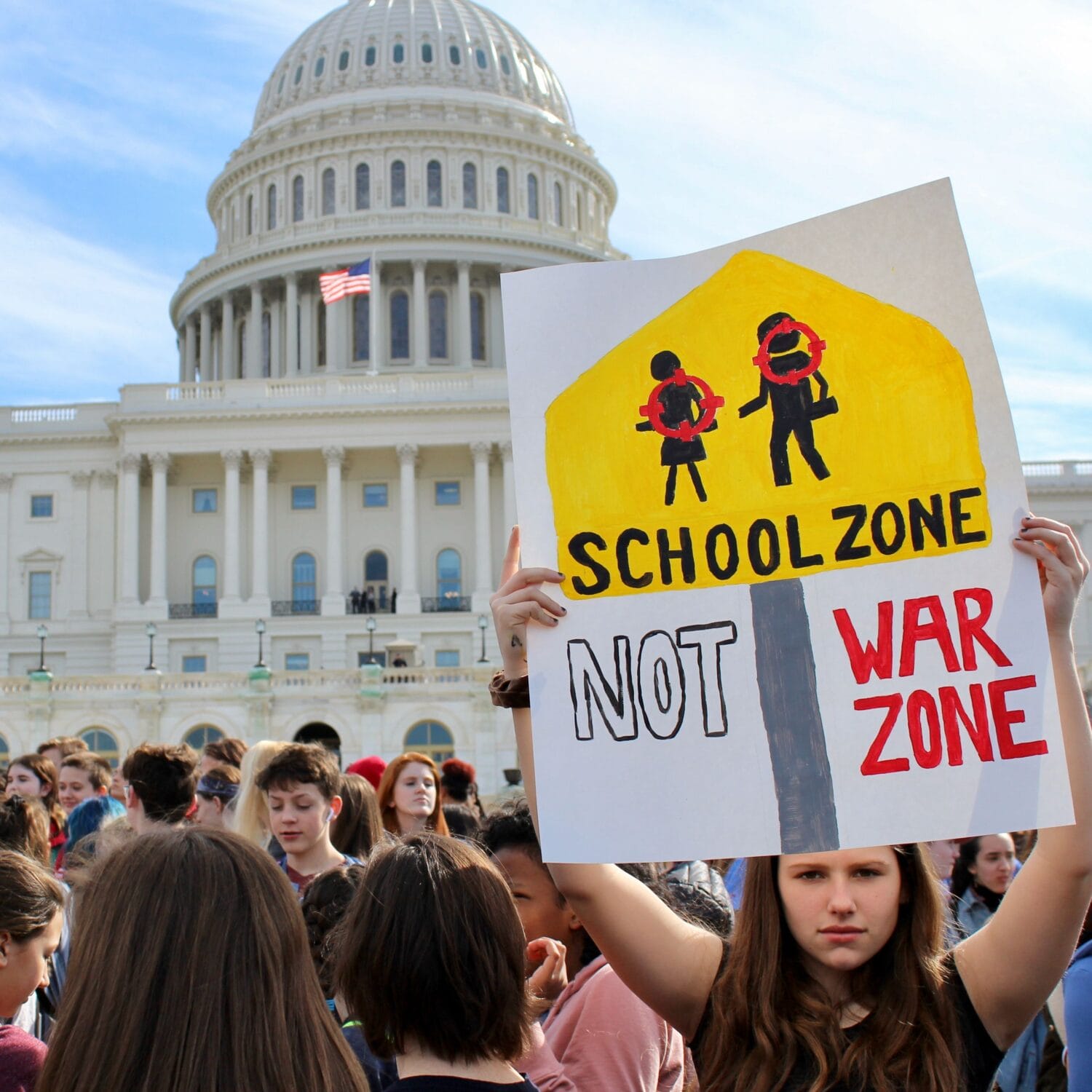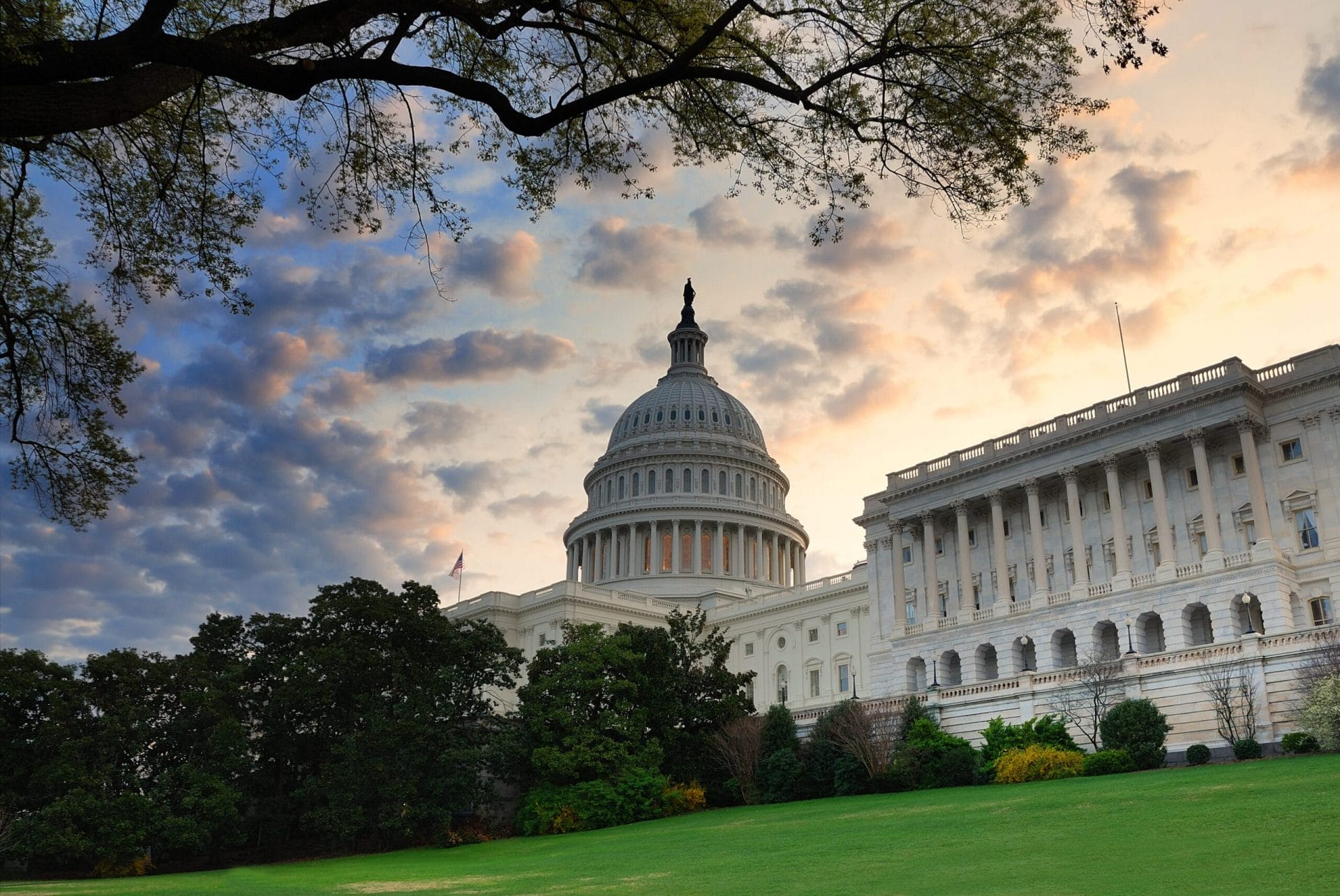
Gun Safety Priorities for the Second Session of the 118th Congress
2023 was a safer year in the United States than the previous few, with many cities seeing significant drops in the number of homicides compared to 2022. In the first year and a half since the landmark passage of the Bipartisan Safer Communities Act (BSCA), hundreds of millions of dollars have flowed to states to implement extreme risk laws and fund violence intervention programs, the new trafficking statute has helped to stem the flow of crime guns into communities, and enhanced background checks on gun buyers under the age of 21 have kept weapons out of the hands of people at high risk of violence.
Despite these successes, gun violence continues to traumatize communities across the country every day. Devastating mass shootings made the headlines in communities from Monterey Park, California, to Nashville, Tennessee, to Lewiston, Maine. It is imperative that Congress do everything in its power to strengthen federal gun laws, invest in evidence-informed violence intervention programs, and support the efforts of federal agencies working to prevent gun violence. Below, you will find our recommendations for the second session of the 118th Congress.
MEDIA REQUESTS
Our experts can speak to the full spectrum of gun violence prevention issues. Have a question? Email us at media@giffords.org.
Contact
Invest in Community Violence Intervention
The 2022 Consolidated Appropriations Act created the Community Violence Intervention and Prevention Initiative (CVIPI) within the Department of Justice (DOJ), allocating $50 million for both 2022 and 2023 to support evidence-informed programs addressing community violence. The Bipartisan Safer Communities Act added an extra $250 million over five fiscal years to CVIPI. This year, Congress should allocate an additional $55 million for CVI, which, in addition to the $50 million appropriated by the BSCA, should be evenly distributed between the Department of Justice and the Department of Health and Human Services (HHS). This funding would bridge the current gap in national public safety policy, enabling numerous high-violence US cities to implement successful CVI strategies. Congress should pass the Break the Cycle of Violence Act, which would provide $5 billion in grants for CVI programs distributed by the DOJ and HHS, and $1.5 billion for youth workforce development distributed by the Department of Labor (DOL).
Fund Gun Violence Research
Each year since Fiscal Year 2020, Congress has appropriated $25 million in dedicated funding for the Centers for Disease Control and Prevention (CDC) and National Institutes of Health (NIH) to study gun violence. This investment has enabled the nation’s premier public health agencies to research gun violence and measures that could help mitigate the crisis, but more information is needed about how gun violence trends geographically, the types of violence that occur in certain places, how well-equipped medical providers are to respond to gun violence, and the most effective public health approaches to reduce gun violence, as well as more data analyzing approaches to reduce and prevent community violence.
Require a Background Check for Every Gun Sale
Source
“Majority Of Voters Say Climate Change Is An Emergency Quinnipiac University Poll Finds; 72% Say Congress Needs To Act To Reduce Gun Violence,” Quinnipiac University, August 29, 2019, https://poll.qu.edu/national/release-detail?ReleaseID=3639.
More than four million illegal gun sales have been stopped by background checks since 1994, and in 2022 alone, the National Instant Criminal Background Check System (NICS) stopped 131,865 sales to prohibited people attempting to buy guns from licensed dealers. Universal background checks ensure that people prohibited from purchasing firearms cannot obtain weapons from an unlicensed or online seller, at an unregulated gun show, or through a sale between unlicensed individuals without first undergoing a background check. Closing this loophole would help to prevent people at high risk of harming others from easily accessing firearms and would save countless lives. The internet has made it increasingly easy for people who have been convicted of crimes, or who are otherwise ineligible to possess firearms, to take advantage of loopholes by arranging gun sales with unlicensed sellers in online chatrooms, on social media sites, at auctions, and through classified ad platforms. Background checks are the strongest policy solution to prevent prohibited individuals from getting their hands on guns. Congress must pass legislation that will require a background check for all gun sales and transfers, with reasonable exceptions for hunting, self-defense, and family gifts.
Provide the FBI with Enough Time to Complete Background Checks
The National Instant Criminal Background Check System (NICS) consists of a network of information maintained by the Federal Bureau of Investigation (FBI) and used to conduct background checks on firearm sales and transfers by federal firearm licensees (FFLs), including federally licensed dealers, manufacturers, and importers. Though most background checks are processed within minutes, occasionally a NICS examiner will need additional time to conduct further research if records indicate the buyer may have a possible firearms prohibition. If the FFL is not notified by the NICS examiner within three business days of initial contact with the system that the sale would violate federal or state law, the dealer may generally choose to proceed with the sale by default. When firearms sales proceed by default, ineligible people can purchase guns, like the hate-motivated shooter who murdered nine Black people in an AME church in Charleston, South Carolina, in 2015. In 2022, nearly 400,000 background checks were not completed within the three business day window, potentially allowing thousands of prohibited purchasers to have accessed guns via the “default proceed” or Charleston loophole. The Bipartisan Safer Communities Act passed in 2022 addressed the default proceed loophole for gun purchasers under the age of 21 by requiring enhanced background checks and increasing the FBI’s time to complete the background check for those purchasers. However, Congress must pass legislation to close the default proceed loophole for all gun purchasers.
Prevent People Convicted of Domestic Violence from Accessing Guns
For the millions of Americans affected by domestic violence every year, an abusive intimate partner’s access to firearms can mean the difference between life and death: Domestic violence assaults involving a gun are 12 times more likely to result in death than those involving other weapons or bodily force. Women in the US are 21 times more likely to be killed with a gun than women in other high-income countries, making it the most deadly country in the developed world when it comes to women and guns. Current federal law prohibits individuals who have been convicted of domestic violence misdemeanors and those who are subject to certain domestic violence protective orders from purchasing or possessing guns. In June 2022, the Bipartisan Safer Communities Act expanded federal law and added dating partners to the category of people who, if convicted of a misdemeanor domestic violence crime, would be prohibited from firearm possession. While this was a significant step forward, gaps in federal law leave victims of domestic abuse vulnerable. Dating partners subject to domestic violence restraining orders remain able to obtain firearms. Convicted stalkers, despite evidence indicating that stalking is often a precursor to further violence, are also generally not prohibited under federal law from obtaining firearms.
Support the Passage and Implementation of Extreme Risk Laws
Far too often, a person who harms themself or others with a gun displays warning signs that are observed prior to the harm occurring. Twenty-one states and the District of Columbia have passed and enacted extreme risk protection order (ERPO) laws, commonly referred to as “red flag laws,” which empower law enforcement and family members to petition courts to issue orders for the temporary removal of firearms when a person is demonstrated to pose a risk of injury to themselves or others by possessing a firearm. ERPO laws only work effectively to reduce gun violence if a state or jurisdiction provides adequate training to stakeholders, including law enforcement, and increases public awareness about the law. In 2023, the Byrne State Crisis Intervention Program created by the BSCA provided more than $257 million to states to implement state crisis intervention court proceedings and related programs or initiatives, including extreme risk protection order programs. It is imperative that states continue to pass these laws and invest in their successful implementation.
Ensure that People Who Become Ineligible to Possess Weapons Relinquish Them
When a person becomes ineligible to purchase or possess firearms because of a felony conviction, a domestic violence restraining order or misdemeanor conviction, an ERPO, or any other reason, it is imperative that states and municipalities have procedures in place to expeditiously separate that person from any firearms in their possession. This includes ensuring that people with a criminal conviction or who are subject to an order necessitating the removal of their firearms are provided with information about ways to sell or turn over their firearms without risk of further criminalization; local law enforcement maintain facilities for the safe storage and eventual return of firearms if a person regains eligibility; and jurisdictions develop protocols and practices to keep deadly weapons out of the hands of the people most likely to perpetrate violence. Currently, there is no federal firearms relinquishment law, and few states provide a statutory process for the relinquishment of firearms.
Spotlight On: Lewiston, Maine
The horrific mass shooting in Lewiston, Maine, in October 2023 underscored how dangerous guns are in the wrong hands. In 2024, Congress should reauthorize and expand critical bipartisan initiatives to prevent firearms from getting into the hands of those that shouldn’t have them.
GET THE FACTS
Gun violence is a complex problem, and while there’s no one-size-fits-all solution, we must act. Our reports bring you the latest cutting-edge research and analysis about strategies to end our country’s gun violence crisis at every level.
Learn More
Improve the Use of Extreme Risk Laws in the Military
In 2023, firearms were the primary method of suicide death for military service members and their family members. Extreme risk protection order (ERPO) laws are designed to identify people in crisis, or otherwise demonstrating risky behavior—like the shooter in Lewiston, Maine, whom colleagues in the military, family members, and law enforcement noticed or were informed was exhibiting dangerous behaviors. ERPO laws are proven to save lives: In Connecticut, researchers estimate that one suicide was averted for every 10–20 orders issued. Twenty-one states and the District of Columbia have now enacted some form of an extreme risk law. These states include hundreds of military bases and installations with hundreds of thousands of service members. When a service member exhibits dangerous behavior, these military sites should be empowered and encouraged to use these proven tools in the states their bases are located to temporarily remove access to firearms—on and off of the site—for their service members. It is imperative that service members not only have access to state ERPOs but that they are sufficiently educated on this proven tool, and that military law enforcement are trained to promote the most effective use of this lifesaving tool.
Spurred on by the horrific shooting at Sutherland Springs, Texas, Congress enacted the Fix NICS Act in 2018. Under its provisions, federal agencies had to establish and substantially comply with an implementation plan to ensure reporting to the background check system during a four-year period, as well as submit a semiannual certification to the US Attorney General detailing whether they are in compliance with the reporting requirements, the number of records they have for each category of prohibited firearm possessors, and the number of records they have submitted. In addition to reauthorizing the Fix NICS Act, Congress should consider strengthening the law by assessing whether the Department of Defense is complying with its benchmark to report to NICS no later than three business days after the final disposition of a relevant judicial proceeding.
Since 2020, firearms have been the leading cause of death among children and teenagers in the United States. According to provisional data from the CDC, firearms were responsible for more than 15% of childhood deaths in 2022, resulting in the tragic loss of more than 2,500 young lives. That’s about four children lost for every 100,000 children in the United States. In no other comparable country are firearms within the top four causes of mortality among children.
Require the Safe Storage of Firearms
Research shows that easily accessible firearms in the home are associated with an increased risk of suicide, as well as unintentional injuries and deaths, among children and young people. More than two-thirds of students who use guns to commit “targeted violence” against their school acquire the gun or guns used in their attacks from their own home or that of a relative, including in the mass school shooting in Oxford, Michigan, in 2021. Research indicates that a modest increase in the number of American homes with safely stored firearms could prevent nearly a third of youth gun deaths caused by gun suicide and unintentional firearm injury. Safe storage laws help ensure guns are securely and safely stored when not in use by their owner, reducing the risk of gun violence in the home. Child access prevention (CAP) laws hold adults liable when minors gain access to negligently stored firearms or when parents or guardians directly provide a firearm to a minor. There are currently no federal child access prevention or safe storage laws.
Regulate Frames, Receivers, and Parts Kits
In recent years, there has been a dramatic increase in the sale of unregulated, untraceable “ghost gun” kits—including frames and receivers that are left just unfinished enough to escape the definition of “firearm” under state or federal law—that have allowed people to easily assemble their own untraceable guns without any background check, serial number, record of sale, or other protections. Additionally, ghost guns may be produced largely or even entirely from plastic, which can render them undetectable by traditional metal detectors and other security scanning systems. This ghost gun market is a dangerously attractive source of weaponry for people who know they would fail a background check to purchase a firearm, including underage youth. Congress must build upon the Bureau of Alcohol, Tobacco, Firearms and Explosives’s (ATF) Rule 2021R-05F, which amended the regulatory definitions of “firearm frame or receiver,” and pass legislation to ensure that all firearm frames, receivers, and parts kits are properly regulated and not easily accessible by people who are not eligible to possess firearms.
Ban Assault Weapons, Large-Capacity Magazines, Conversion Devices, and Bump Stocks
Assault weapons are designed to maximize the number of people shot in the shortest amount of time; wounds caused by assault weapons are more severe and lethal than wounds caused by other firearms. As a result, these weapons are often the weapon of choice for mass shooters—they were used in the seven deadliest shootings in the past decade. During the 10-year period the federal assault weapons ban was in effect, however, mass shooting fatalities were 70% less likely to occur compared to the periods before and after the ban. Importantly, researchers have been able to demonstrate that the federal assault weapons ban prevented mass shootings and decreased the diversion of assault weapons to criminal use. Under current federal law, an individual must be 21 to purchase a handgun from a gun dealer, but only 18 to purchase an assault weapon.
Source
Lori Post et al., “Impact of Firearm Surveillance on Gun Control Policy: Regression Discontinuity Analysis,” JMIR Public Health and Surveillance 7, no. 4 (2021): e26042, https://doi.org/10.2196/26042. Study defined mass shooting as four or more victims killed with a firearm at a public location. Familicides and felony killings were excluded.
One of the key features of assault weapons is the ability to accept detachable large-capacity ammunition magazines, which are magazines with a capacity of more than 10 rounds of ammunition. The danger posed by these weapons is substantially increased by these magazines, allowing a shooter to fire many rounds in a row and quickly reload. An analysis of mass shootings between 1990 and 2017 found that attacks involving large-capacity magazines resulted in a 62% higher death toll. The time a shooter takes to reload his weapon can be critical in enabling victims to escape and law enforcement or others to intervene. When shooters have large-capacity magazines, more bullets can be fired before this crucial time period for escape or other intervention. Polling consistently shows that nearly two-thirds of Americans support laws that ban large-capacity magazines.
Auto sears and similar conversion devices are inserted into semiautomatic firearms to convert them into fully automatic firearms, capable of firing multiple rounds with a single trigger pull. Sometimes referred to as “switches,” these conversion devices can be easily inserted into firearms in a matter of seconds and enable a shooter to rapidly fire multiple bullets with a single trigger pull, mimicking machine gun fire. Auto sears are regulated under the National Firearms Act as machine guns, meaning it has been illegal to manufacture or import them since 1986. However, access to 3D printers and the commercial availability of auto sears on the internet (often marketed as a different product or available on the dark web) has made the existence of these conversion devices more common. According to a March 2022 investigation conducted by Vice and The Trace, more than a thousand illegal auto sears had been recovered in connection with at least 260 federal prosecutions since 2017, with a significant increase in the number of cases being filed annually. This staggering increase in the use of conversion devices, especially in connection with federal crimes, highlights the need to regulate these dangerous devices.
In October 2017, a gunman used assault weapons outfitted with bump stocks to murder 60 people and injure hundreds of others in the nation’s deadliest mass shooting. Bump stocks are designed to accelerate the fire of semiautomatic weapons, allowing a shooter to fire at a rate of 400 to 800 rounds per minute and convert firearms into fully automatic weapons that fire multiple bullets with a single trigger pull. Although the Bureau of Alcohol, Tobacco, Firearms and Explosives (ATF) issued a rule clarifying that existing prohibitions against fully automatic weapons also cover bump stocks, the rule has been repeatedly challenged in courts and will be heard before the Supreme Court this year. Congress should pass legislation to explicitly and permanently ban the manufacture, possession, sale, or transport of bump stocks and acceleration devices.
Support ATF’s Efforts to Reduce Gun Violence
The Bureau of Alcohol, Tobacco, Firearms and Explosives (ATF) is tasked with enforcing federal firearms laws, holding gun dealers accountable, and addressing the proliferation of dangerous firearms. However, ATF faces challenges due to understaffing and limited resources, hindering its mission. Ensuring ATF has adequate staff is essential for effective oversight of the gun industry, especially gun dealers who supply the majority of firearms. As a consequence of limited oversight, corrupt gun dealers represent a major source of guns trafficked to dangerous individuals and criminals, either directly or through straw purchasers (who buy guns on others’ behalf) and gun traffickers (who purchase guns to resell on the illicit market).
In addition to broad reductions in funding for ATF, House Republicans have included a number of riders in the Fiscal Year 2024 (FY24) Commerce, Justice, Science, and Related Agencies Appropriations Act that would prohibit ATF from using funds to implement or enforce any recent ATF rulemakings. One rider goes as far as to defund any rulemakings issued by ATF after President Biden took office, while other riders target specific ATF rules. If enacted, these riders would effectively overturn ATF’s recent rulemakings, crippling ATF’s ability to regulate dangerous devices like ghost guns and stabilizing braces. It is imperative that riders undermining ATF rulemakings be removed from any appropriations legislation.
Without increased funding, ATF’s efforts will be limited. Additionally, budget riders like the Tiahrt Amendments further hinder law enforcement by restricting ATF’s ability to trace crime guns, preventing the use of searchable databases, and impeding the release of crucial trace data. Congress must increase funding for ATF and reconsider restrictive riders which undermine its work.
Invest in the Background Check System
The FBI’s National Instant Criminal Background Check System (NICS) is a critical tool for assessing individuals’ eligibility to purchase or possess firearms, incorporating criminal, mental health, and civil order records. Processing nearly 30 million background checks in 2023, NICS is integral to ensuring responsible gun ownership. Additionally, the BSCA now requires that the FBI conduct enhanced background checks for firearm sales or transfers to individuals under 21 (U21). These U21 checks involve expanded outreach by the FBI to state and local officials who may have access to additional disqualifying information. Since implementing the BSCA’s enhanced background checks in October 2022, the FBI has conducted enhanced background checks on more than 200,000 transactions. Those checks have kept more than 1,900 firearms out of the hands of dangerous and other prohibited persons, 527 of which were based solely on information received through the BSCA-enabled outreach.
Last year, ATF proposed a new rule regarding the definition of “engaged in the business” as a dealer in firearms, ATF 2022R-17. This proposed rule would require anyone who meets the amended definition of “engaged in the business” to become a federal firearms licensee and conduct background checks in anticipation of a firearm sale. If ATF’s proposed rule is finalized, NICS will need additional resources to address the increase in background checks.
Prevent Concealed Carry Reciprocity in the District of Columbia
As a federal district, Washington DC falls under the legislative authority of Congress. In their FY24 Financial Services and General Government bill, House Republicans included a concerning “concealed carry reciprocity” provision that would permit visitors with concealed carry permits issued by other states to carry firearms within Washington DC. Notably, the Senate version of the bill did not include this rider. However, as the finalized FY24 budget has yet to be enacted by Congress, it remains to be seen whether this language will be included in the final bill text. This provision, if enacted, would endanger the residents of Washington DC. Of the 26 states that now authorize people to carry concealed handguns in public without a permit or background check required, all but one also allow people to purchase handguns without a background check, meaning that the residents of 25 states are generally able to purchase and carry concealed weapons designed to take human life in most public spaces without ever passing any background check or ever receiving any safety training or information about safe and responsible handling of firearms. Congress should not subject DC residents to the whims of every state legislature in the country, especially when it comes to gun safety.
Prevent Veteran Suicides Involving Firearms

1 in 5 gun suicide victims are veterans
Source
“2019 National Veteran Suicide Prevention Annual Report,” US Department of Veterans Affairs, Office of Mental Health and Suicide Prevention, September 2019, https://www.mentalhealth. va.gov/docs/data-sheets/2019/2019_National_Veteran_Suicide_Prevention_Annual_ Report_508.pdf. See also, “National Suicide Data Report Appendix,” US Department of Veterans Affairs, Office of Mental Health and Suicide Prevention, https://www.mentalhealth.va.gov/ suicide_prevention/data.asp.
Since 1998, because of the Brady Handgun Violence Prevention Act, the Department of Veterans Affairs (VA) has shared records on beneficiaries with appointed fiduciaries for inclusion in the National Instant Criminal Background Check System (NICS). The fiduciary appointment is based on a VA determination that the beneficiary is “mentally incompetent” under VA regulations. This procedure prohibits veterans who have been found to lack the mental capacity to manage their own affairs from possessing a gun unless they can show that their ownership of a gun would not pose a public safety threat. During this process, the VA provides the veteran multiple avenues through which this determination can be challenged and the veteran’s access to guns restored.
More than 6,500 veterans die by suicide each year, and veterans account for roughly one in five firearm suicides in the US. Nearly 70% of veteran suicides involve firearms, compared with roughly 51% of all suicides nationwide. Allowing veterans found incompetent to obtain a firearm will only exacerbate this problem, endangering their lives and others.
Both the House and Senate amended their FY24 Military Construction, Veterans Affairs, and Related Agencies Appropriations bills with provisions that would undermine the Department of Veterans Affairs’s ability to send a beneficiary’s name to NICS whenever a fiduciary is appointed to help that person manage VA benefits. It is imperative that any restrictions on the VA’s ability to report to NICS be removed from the final FY24 appropriations omnibus.
Spotlight On: Upholding Federal Regulations
In the 118th Congress, House and Senate Republicans have repeatedly attempted to utilize the authority granted to them by the Congressional Review Act (CRA) to overturn ATF rules enforcing federal firearms laws. Congress must reject any efforts to undermine any new rules finalized by ATF this year.
Specifically, in September 2023, ATF proposed a rule, ATF 2022R-17, regarding the updated definition of a federal firearms dealer that was included in the Bipartisan Safer Communities Act (BSCA). The proposed rule helps further identify individuals who are “engaged in the business” of selling firearms and thus must obtain a federal firearms license (FFL) and conduct background checks. Currently, only licensed gun dealers, those holding an FFL, are required to conduct background checks, leaving a gaping loophole with respect to unlicensed sellers of firearms. Up to 80% of firearms used for criminal purposes were obtained from unlicensed sources, meaning no background check was required. This proposed rule will help address this dangerous problem, cracking down on unmonitored online firearm sales and other corrupt dealers. If and when the rule is finalized, the rule must be allowed to take effect.
TAKE ACTION
The gun safety movement is on the march: Americans from different background are united in standing up for safer schools and communities. Join us to make your voice heard and power our next wave of victories.
GET INVOLVED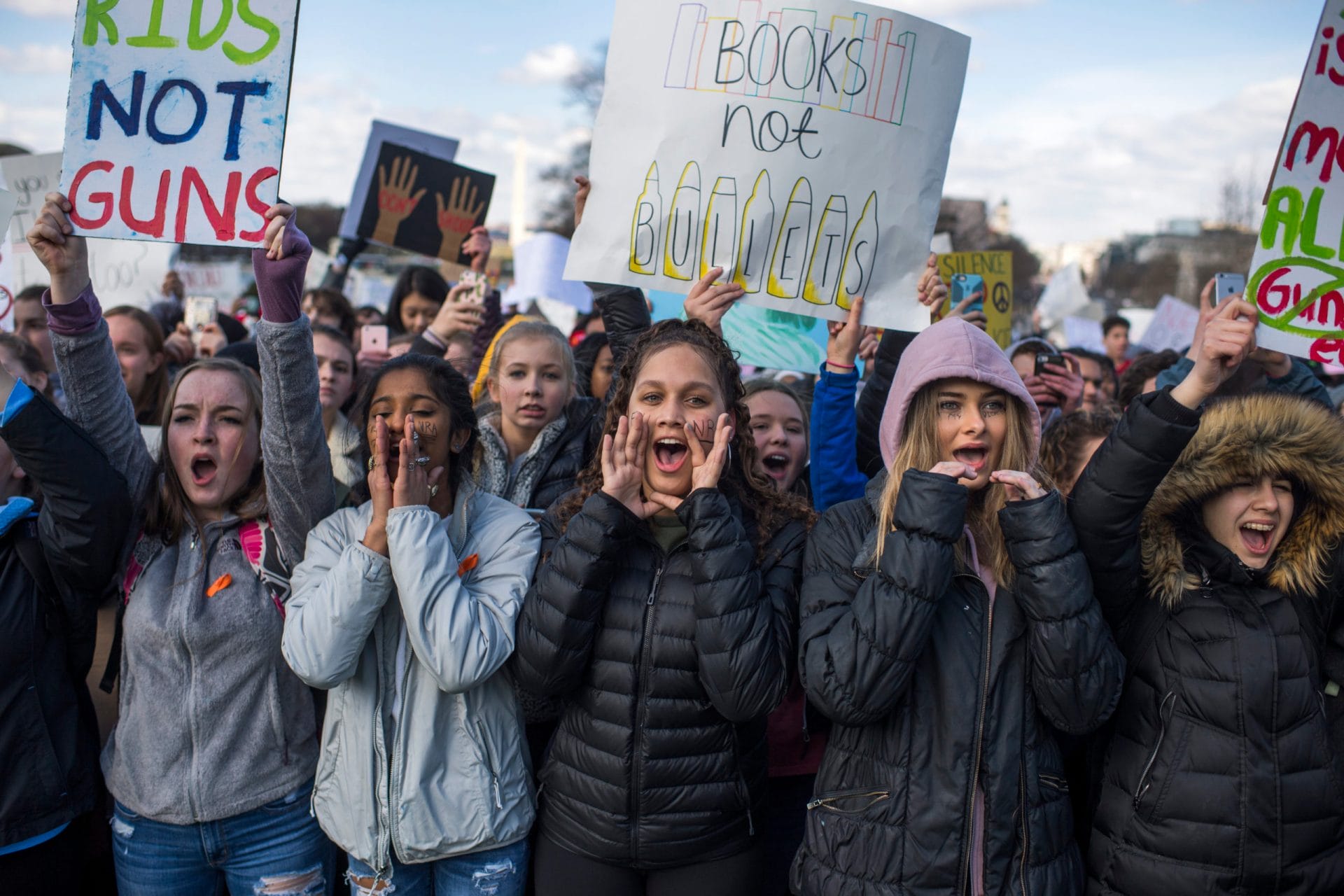
End the Gun Industry’s Legal Immunity
In 2005, the Protection of Lawful Commerce in Arms Act (PLCAA) became law, establishing a shield for the gun industry, including gun manufacturers and dealers, from nearly all civil liability for the dangers their products pose. PLCAA prohibits “qualified civil liability actions,” which are defined as civil or administrative proceedings which “result from the criminal or unlawful misuse” of firearms or ammunition.
Civil liability plays an important role in injury prevention. In circumstances where legislators have been unwilling to enact regulations to improve safety, dangerous products and careless industry practices are normally held in check by the possibility of civil litigation that enables injured individuals to recover monetarily. This principle does not apply to the gun industry because it has obtained unprecedented immunity from this longstanding system of accountability. PLCAA prevents victims of gun violence from seeking justice in the court in instances where a gun business has acted with reckless or blatantly negligent disregard for public safety. The inability to pursue civil action fosters an environment where manufacturers and dealers can operate with impunity while bringing deadly weapons into the commercial market. This lack of accountability stands in direct opposition to public safety, and Congress must pass legislation to repeal the gun industry’s unprecedented legal immunity.
Beginning in 2021, states began enacting legislation to expand the ability of victims and/or public officials to bring civil lawsuits against firearm industry actors for illegal conduct. Currently, eight states—California, Colorado, Delaware, Hawaii, Illinois, New Jersey, New York, and Washington—have “gun industry accountability” laws, also known as “victims access to justice” laws, which expressly codify a firearm industry standard of conduct in the civil code with obligations and prohibitions that are unquestionably and specifically applicable to the sale and marketing of firearms. The state laws are broadly similar and require firearm industry members to implement reasonable controls, such as standard procedures, safeguards, screening or security standards, and safe business practices, in order to prevent specified harms, such as requiring firearm dealers to take reasonable steps to prevent selling or distributing firearms to straw purchasers and gun traffickers.
Stop the Industry from Marketing Weapons Irresponsibly
The gun industry has spent decades using unfair and deceptive advertising to sell deadly weapons to an American public that has been falsely led to believe that gun ownership is a safe way to protect their home and family. For years, gun advertisements have told consumers that having a gun in their home or on their person makes them and their loved ones safer, a message that is contrary to all of the evidence. The gun industry now uses social media to market to young audiences, who are particularly susceptible to advertisements for inherently dangerous products like guns and potentially valuable lifelong customers for the industry. The firearm industry trade association even published research describing youth as “obvious ‘low-hanging fruit’ in recruitment,” and a “large relatively untapped market.”
The Firearms Accountability Counsel Taskforce (FACT) recently petitioned the Federal Trade Commission (FTC) to take action against the gun industry’s unfair, deceptive, and illegal advertising practices and enforce consumer protection and advertising regulations against the gun industry. In an executive order, President Biden directed the FTC to “issue a public report analyzing how gun manufacturers market firearms to minors and how such manufacturers market firearms to all civilians, including through the use of military imagery.” Congress should refrain from interfering with the FTC’s authority to both investigate these practices and enforce the law.
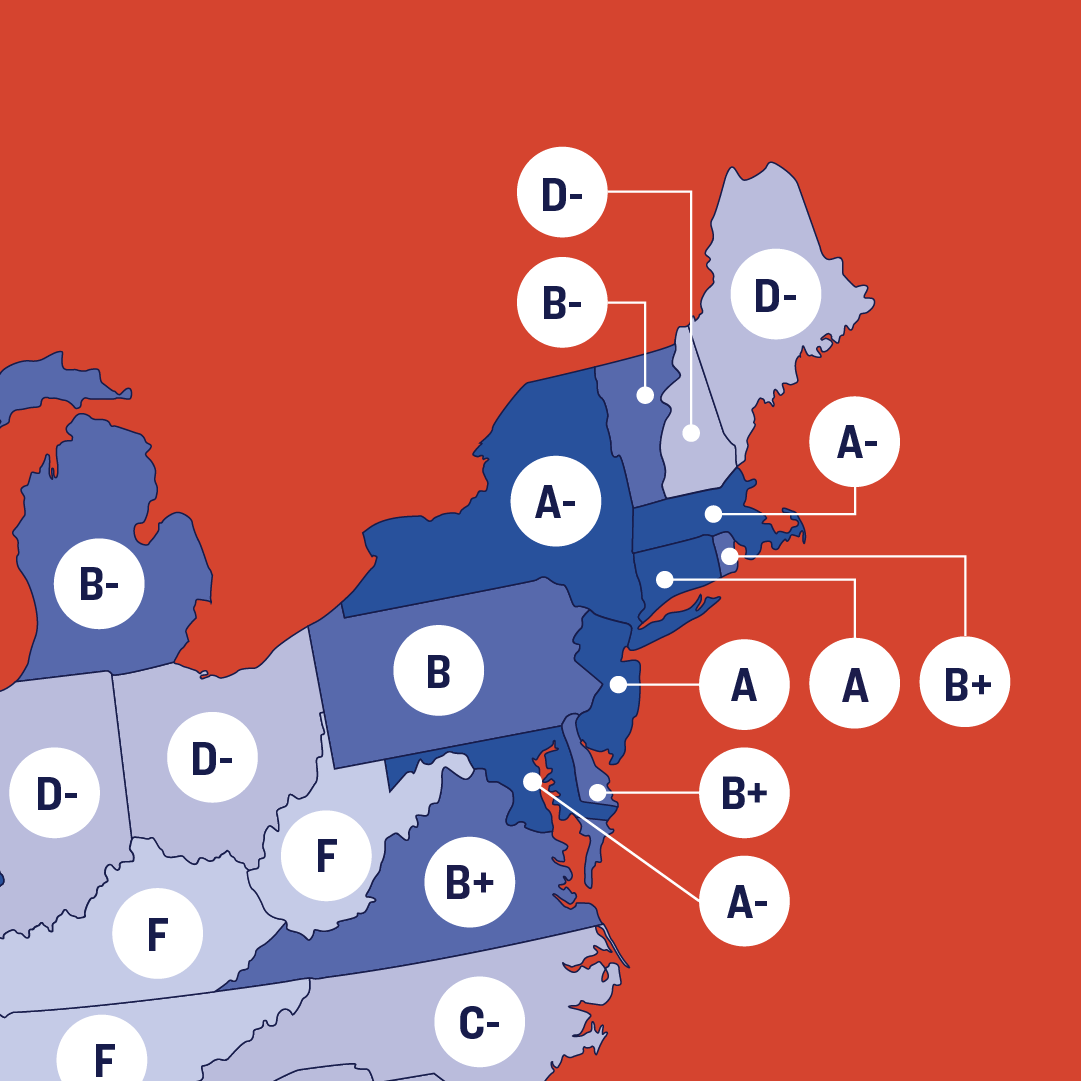
SPOTLIGHT
GUN LAW SCORECARD
The data is clear: states with stronger gun laws have less gun violence. See how your state compares in our annual ranking.
Read More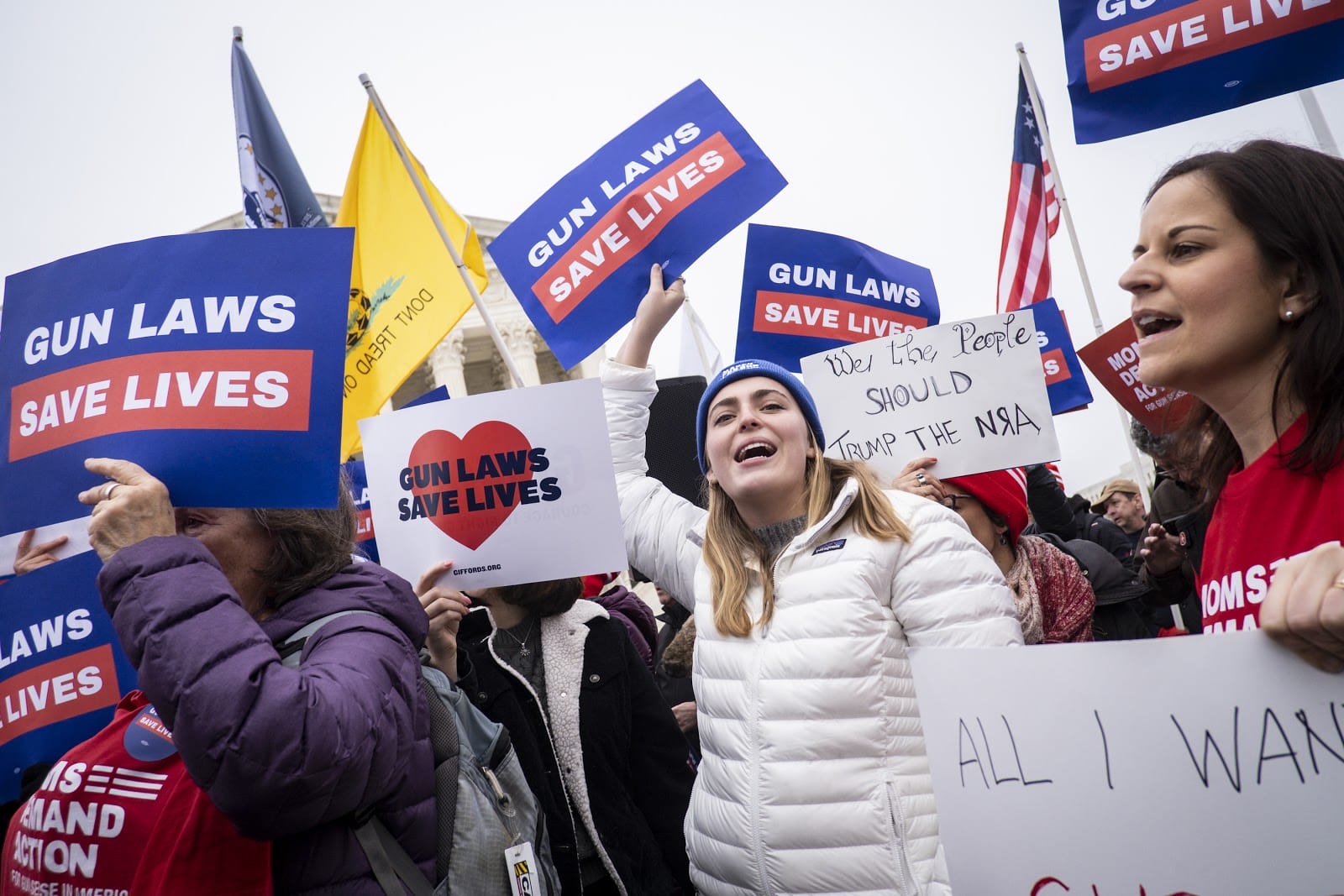
JOIN THE FIGHT
Over 40,000 Americans lose their lives to gun violence every year. In communities, courts, and ballot boxes nationwide, Giffords fights to save lives from gun violence. Will you join us?

